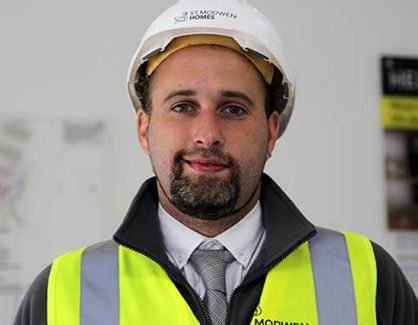-content-type-block-(24).png)
The construction sector
Taking a construction-related course with the University of Wolverhampton means benefiting from studying at Springfield, Europe’s largest architecture and built environment campus.
The UK’s construction sector is one of the largest in the economy, bringing in £117bn which is 6.6% of the UK’s GVA and employing around 2.4 million people. It underpins everything in our society and economy, touching everyone’s life in countless ways, from home to work to education to social activities, and everything in between.
Types of careers in construction
There are many different and varied careers involved in the construction industry, so the roles listed are not extensive but provide an overview of different career paths.
As a construction manager or site manager, you'll be responsible for ensuring that a building project is completed safely, within an agreed timeframe and budget.
Quantity surveyors manage all costs relating to building and civil engineering projects, from the initial calculations to the final figures.
An architect designs buildings and spaces, restoring or renovating existing structures or designing new ones.
A building control surveyor or officer makes sure that building regulations are in place and observed throughout construction projects. They may also survey damaged structures to decide whether they need to be demolished or if they can be repaired safely.
Project managers plan and coordinate projects, from inception to delivery - managing resources, budget and people to achieve a desired outcome.
A structural engineer is responsible for making sure that structures are stable and can withstand the pressures of the environment and day-to-day use. A structural engineer’s input ensures that the right materials are used for a project.
The construction sector is at an exciting time. The Clean Growth Grand Challenge set by the government is focused on bringing together government, business, and organisations across the UK to ensure that at least halve the energy use of new buildings by 2030. This creates both challenges and opportunities for the sector across the country, with a focus on making buildings more energy-efficient and ensuring that they use smart technologies.
In 2021, it was reported that the West Midlands will need to recruit 25,000 new workers to meet demand, having bounced back from the Covid-19 pandemic. The Construction Skills Network 2021-25 forecast that the amount of construction work in the region will grow 4.8% each year (above the UK average of 4.4%) until 2025.
A plan to develop 5,000 new homes and 35,000 square metres of commercial space has been detailed by the NEC Group, and 1,300 residential homes in Longbridge in Birmingham, which will join 1,450 plots already developed on a brownfield site that is undergoing a £1bn investment project.
Construction is a healthy industry everywhere, but especially so today, in the West Midlands, where there is a gap of 17,500 people required to complete construction plans over the next three years.
/prod01/wlvacuk/courses/media/images/2019-re-design/blurb-block/component-1/help_from_tutor.jpg)
Our expertise
The School of Architecture and Built Environment at the University of Wolverhampton is housed at our brand-new, dedicated construction “super-campus” on a 12-acre city centre brownfield regeneration site, Springfield Campus.
Our courses are developed in close consultation with industry practitioners, this means we provide up-to-date technical knowledge and design flair to work in today’s ever-changing industry. Our facilities are industry-standard, and include the latest apparatus for inspecting and testing land, material, soil, and foundations. Students can also use drones, 3D laser scanners, ground-penetrating radars and VR tools.
This and much more equipment at our students’ disposal, alongside our team’s expertise, provides a unique and world-leading learning experience
Our courses
Our links with industry
We collaborate with a wide range of businesses in all areas of our work: in course creation and delivery; to provide placements and work experience for our students; in the cutting-edge research in areas of national importance, such as brownfield research. Every year we hold a 'Meet The Employer' event which gives students the opportunity to meet employers and make connections that can help further their career prospects.
Our research supports and enhances the activities of industrial, commercial and public sector organisations.
Whichever area of the industry you want to pursue your career in, you can rest assured that your degree is accredited by the relevant professional body, including:
- Chartered Association of Building Engineers
- Chartered Institute of Architectural Technologists
- Chartered Institute of Environmental Health
- Chartered Institution of Highways & Transportation
- Chartered Institute of Building
- Institution of Civil Engineers
- Institute of Highway Engineers
- Institution of Structural Engineers
- Quantity Surveyors International
- Royal Institute of British Architects
- Royal Institution of Chartered Surveyors
FAQ's
Frequently Asked Questions
There is no single method of getting into a construction job, but routes include entry-level roles, apprenticeships, and qualifications such as undergraduate and postgraduate degrees relevant to the sector. Large construction companies sometimes offer graduate programmes which they grow each year, providing on-the-job training to grow your skills as you work.
One of the best ways to enter a construction career is to study a qualification with an institution that provides chartered courses, such as the University of Wolverhampton. These will often give you access to partnered companies in the industry looking to employ apprentices, new-starters, and freshly-qualified graduates.
If you plan to work on a construction site in any capacity, there are a number of qualifications, certificates, and cards you may need before even setting foot on the premises. These often relate to health and safety, such as the CSCS Card certification, SSSTS, SMSTS, and asbestos awareness.
Alternatively, even if you don’t plan to work on site, such as if you train as an architect, you may be required to have certain qualifications to prove that you are able to do the job. Which qualifications you need will depend on what your role entails.
Working in construction can be a highly rewarding career with many benefits and satisfying elements. People depend on construction in every area of their lives – the industry is responsible for the building of everything from their home to the roads that take them to whichever shops, workplaces, or learning institutions they need to visit, to the structures that home the public services that clean their water, provide their electricity, and supply their gas. When you work in the construction industry, the structures you help build matter to the community and society itself.
The amount of experience you need to work in construction depends on the job you want to do. A labourer, for example, would not necessarily need any qualifications to be accepted into their job and could learn safety standards and procedures during their job; an architect or quantity surveyor will likely need a firm foundation of qualifications before taking up their position.
If there is a particular role in the construction industry that interests you, research that job to find out which qualification(s) will be most beneficial to helping you achieve your ideal role.
Studying a construction course with the University of Wolverhampton will give you access to a course team as well as other experts from across the university who can help you find work experience in your chosen field. If you study a sandwich degree course, you will have a full year to spend working in industry, learning how the workplace actually functions and feels. First-hand experience is key when you are looking to enter an unfamiliar role, and a chartered degree is an ideal way to explore your professional potential.


/prod01/wlvacuk/media/departments/digital-content-and-communications/images-2024/240328-Varsity-Line-Up-Resized.jpg)
/prod01/wlvacuk/media/departments/digital-content-and-communications/images-18-19/220325-Engineers_teach_thumbail.jpg)
/prod01/wlvacuk/media/departments/digital-content-and-communications/images-2024/240515-Spencer-Jones-Award-Resized.jpg)
/prod01/wlvacuk/media/departments/digital-content-and-communications/images-2024/240320-Uzbekistan-Resized.jpg)
/prod01/wlvacuk/media/departments/digital-content-and-communications/images-2024/240229-The-Link-Resized.jpg)
/prod01/wlvacuk/media/departments/digital-content-and-communications/images-2024/240516-Andy-Gibson-Resized.jpg)


-content-type-block-(23).png)
-content-type-block-(25).png)









